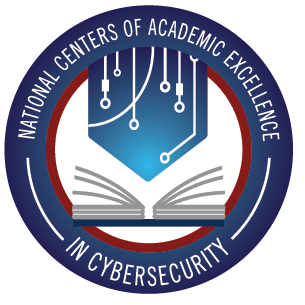Cybersecurity

Why Choose Our Program?
A Bachelor of Science degree in cybersecurity provides a strong background in computing foundations along with rigorous, hands-on training in cutting-edge areas within cybersecurity, including:
- Intrusion Detection
- Network Security
- Penetration Testing
- Digital Forensics
Cybersecurity professionals are responsible for anything from responding to simple hacking threats to complex ransomware attacks. With the demand for this profession at an all-time high, students graduating from this program are able to find jobs right after they graduate. Our graduates are accepting jobs as cybersecurity specialists and information security analysts responsible for the design and operation of computer systems and networks for businesses and government agencies.
Jacksonville University BS in Cybersecurity program has been designated as a NSA National Center of Academic Excellence in Cyber Defense Program of Study.

Jacksonville UniversityBachelor of Science in Cybersecurity
A Bachelor of Science degree in cybersecurity provides a strong background in computing foundations along with rigorous, hands-on training in cutting-edge areas within cybersecurity, including:
- Intrusion Detection
- Network Security
- Penetration Testing
- Digital Forensics
Cybersecurity professionals are responsible for anything from responding to simple hacking threats to complex ransomware attacks. With the demand for this profession at an all-time high, students graduating from this program are able to find jobs right after they graduate. Our graduates are accepting jobs as cybersecurity specialists and information security analysts responsible for the design and operation of computer systems and networks for businesses and government agencies. Jacksonville University's BS in Cybersecurity program has been designated as an NSA National Center of Academic Excellence in Cyber Defense Program of Study.
Jacksonville University Bachelor of Science in Cybersecurity
JU's computer science program has prepared me for the real world by giving me the opportunity to explore, to fail and to grow. And I've done this through leading projects in class, collaborating with faculty outside of class and also competing in national competitions outside of the classroom. Through these experiences, I've learned not to memorize certain things, but to learn these things and apply them to different scenarios. And I think that's super valuable, because that's how the real world is.
So, whenever I came to JU, I noticed there was three top tier professors that are here that are kind of overseeing the program. I said to myself, if I can pick all their brains and collectively gather all the information that I can from each of these professors, I'll be a successful student here.
Davis College of Business and Technology offers two standalone bachelor of science program. The BS in computer science and the BS in cyber security program.
My courses will always have a practical and hands-on exercises, real case scenarios, virtual attack simulation or actually building a physical system. So, for example, in my introduction to cyber security courses, student can learn how to integrate software and hardware together. If you code it this way, this is how you see the output.
Our BS in cyber security has been designated as a NCAE program, National Excellence in Cyber Security. With the support of our advisor board members like Florida Blue, we have JU cyber ranch um platform our students are using right now. This is an enterprise level platform, and our students could be able to do the blue team red team computation by using this platform.
I benefit from the small class sizes, because I'm not just another face. I get that one-on-one connection with my professors. I'm able to ask questions freely, and classroom discussions always feel like collaboration and not so much competition. So, I really value that.
The most rewarding aspect of teaching for me personally is the aha moment: “Yes, I figured it out!”
My favorite part of the cyber security program is probably the labs and the instructors.
I would have to say the flexibility and the freedom. I'm able to carve my own path. For myself, I'm interested in the intersection between machine learning and cyber security, which is so new, but at JU professors have made it possible for me to explore that and learn that and get that hands-on practice.
I always listen to my students and learn from them what are their goals, what they are trying to do in the future, and help them to build the way that leads them to their dreams.
I've had a lot of instructors in my life, and the ones here genuinely, actually care about your education.
For high school students who are considering computing and cyber security, I would encourage them to be curious. Before joining the school or even considering the program, dive into coding, learn a new language like Python, for example. Generally, if you like to fix broken things, then cyber security is a good field for you, because there’s going to be always, always a broken system that needs someone to fix it.

CybersecurityCurriculum
Our Cybersecurity major provides a strong foundation towards a career involving computer and network security in various industries, including finance, logistics, healthcare, education, and government.
Year 1: gaining experience in computer hardware, software concepts, and application development.
Year 2: An in-depth study of cybersecurity principles, network and wireless communication, operating systems, and systems administration.
Year 3: Students participate in hands-on learning for various areas including internet security, penetration testing, and digital forensics, cyberattacks analysis, and detection.
Year 4: Students use the knowledge and skills they learned in the previous three years and apply them through cybersecurity practicum projects.
The program emphasizes the development of analytical and problem-solving skills, communication, and teamwork – all highly valued areas in the industry.
Program Learning Outcomes:
Graduates should be able to:
- Manage and administrate different operating systems and be able to automate different tasks using scripting languages.
- Function effectively as a member or a leader of a team engaged in activities. Students will communicate effectively in a variety of professional contexts.
- Explain key networking protocols
- Apply the fundamentals of cybersecurity and basic cryptography.
- Apply principles of programming and design applications.
- Apply security principles and practices to identify threats and defend a system or network.
- Exploit and/or mitigate vulnerabilities and implement a defense solution.
Potential Career Paths
Our cybersecurity program prepares students for the following positions:
- Security Architect
- IT Security Engineer
- Security Analyst
- Information Security Officer
- Security System Administrator
- IT Security Consultant
- Forensic System Analyst

I am currently working on Nutanix implementation on the Cloud and Infrastructure team for Blue Cross Blue Shield. Jacksonville University has provided me with the resources and training required to launch my career at Blue Cross Blue Shield.



INDUSTRY PARTNERS
We are proud to work closely with industry leaders to ensure that our curriculum meets present and future business needs. These are a few of the businesses we work with.
